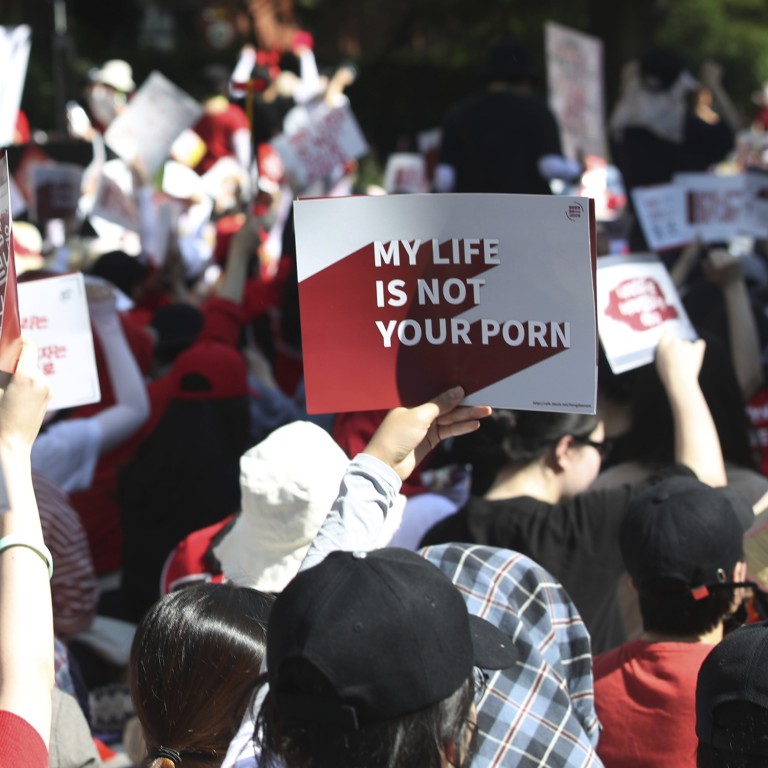
South Korea sees rise of women-only gyms, camp sites, other spaces amid surge in sex offences
- An increasing number of spaces – guest houses, dormitory-style flats and study cafes among them – are limiting their services to women in South Korea
- Experts say the main reason more women are opting for single-sex facilities is the fear of becoming the victim of voyeurism, stalking, rape or worse
“For one thing, I became more confident since I don’t have to worry about getting unwanted stares from men. I can wear tight outfits such as leggings, cycling pants and tank tops without feeling self-conscious,” she said.
Jeong also feels that the gym is better suited for women. “I like the fact that there’s a variety of lighter dumbbells, weight plates and a bigger stretching zone compared to my previous gym. And being surrounded by same gender people, I don’t feel intimidated while using weight machines that I’m not very good at,” she said.

Gyms are not the only facilities limiting their services only to women.
In recent years, an increasing number of female-only spaces have emerged in South Korea, ranging from study cafes to gosiwon or dormitory-style flats, guest houses and shared offices to camp sites.
A camp site launched in May located in Cheonan, South Chungcheong province, is open only to women who want to enjoy a quiet and peaceful experience in the absence of men, according to an online community of campers.
Why debate over women in military is ruffling feathers in South Korea
Gender segregation can also be found in government policies.
In June, the Ministry of Land, Infrastructure and Transport allowed taxi ride-sharing services for the first time after the practice was prohibited in 1982. However, except for van-type cabs which accommodate five passengers and more, ride-sharing is limited to people of the same sex.
The ministry explained that the measures are aimed at alleviating people’s anxiety over sharing a ride with a stranger, as well as concerns about potential crimes.

Experts say the main reason more women are opting for single-sex facilities is the fear of becoming the victim of offences such as voyeurism, stalking and rape, which have surged in recent years.
“It is regretful that women search for such spaces and are willing to spend money specifically to stay away from men. But at the same time, it shows how our society has been failing to provide a safe environment for them,” said Yun Ji-yeong, a professor of philosophy at Changwon National University and an expert on gender-related issues.
“Women are very concerned about becoming the targets of gender-based crimes which seem to take place anywhere, anytime. Illegal filming using hidden cameras, for instance, occurs not only in public restrooms, but also in places like libraries, hotels, or even at home.”
Since 2017, about 5,000 cases of illegal filming with the use of hidden cameras have been occurring each year, according to the National Police Agency.
After K-pop, is spycam porn the next great Korean cultural export?
Shin Kyung-ah, a professor of sociology at Hallym University, echoed the sentiment.
“It is a fact that women are more vulnerable to violent crimes than men. Data shows that over 80 per cent of victims of violent crimes are female. In that sense, women-only spaces seem to offer respite from such concerns,” said the former head of the Korea Association of Women’s Study.
“The necessity of some women-only facilities like parking spaces is debatable. However, when it comes to places like houses where we spend most of our time, everyone should feel secure and protected,” she said.
Both experts anticipated that the popularity of women-only places will persist unless gender-based violence and crimes are eradicated.
What women need more are robust laws and measures to tackle gender-based violence
“The separation of genders is not a fundamental solution,” said Yun. “What women need more are robust laws and measures to tackle gender-based violence along with adequate protection measures.”
Some women-only spaces have drawn backlash from men who feel excluded.
In 2020, the National Human Rights Commission of Korea described a provincial library in Jecheon that was open only to women as inherently sexist and said it violated basic human rights. The watchdog expressed the opinion in response to a petition filed by men’s rights groups.
Established in 1994, the library had opened its doors only to women in line with the wishes of the person who donated the funds to build the facility. But following the human rights commission’s recommendation, it began to allow limited services to men.
South Korea’s ‘antifeminist’ Yoon faces uphill task to abolish women’s ministry
Meanwhile, women-only parking spaces that were introduced by Seoul city government in 2009 will fade into history, following consistent debates over their necessity and efficiency.
The Seoul Metropolitan Government announced in August that women-specific parking spaces will become “family-prioritised spaces”, and the spots will be designated for families with children, pregnant women or people with disabilities.

